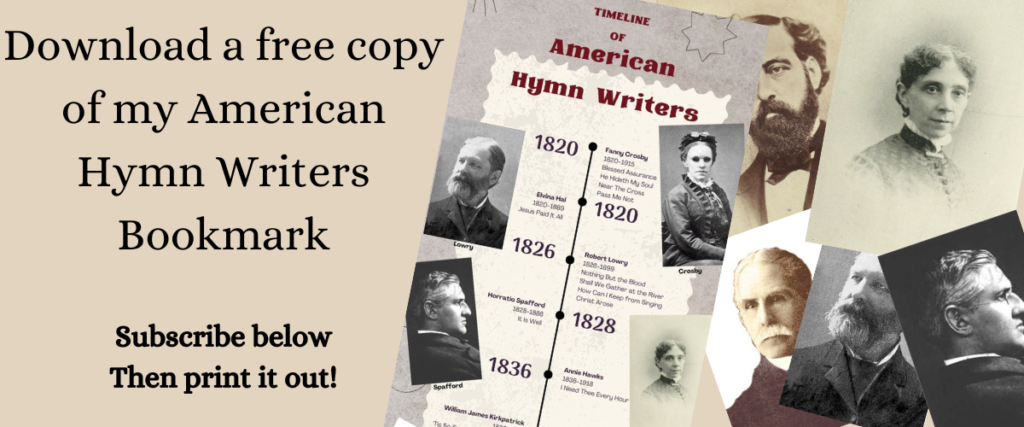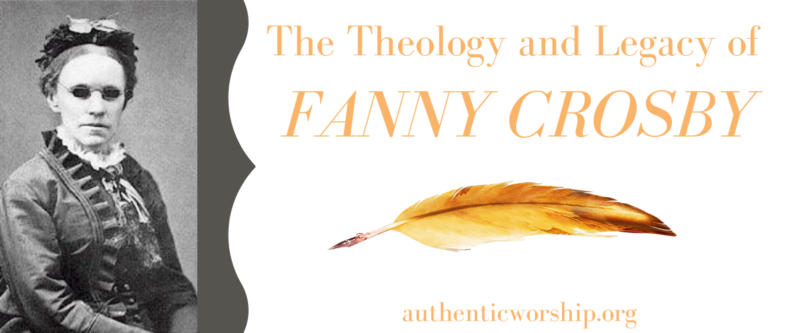The Theology and Legacy of Fanny Crosby
They say that behind every great songwriter is a story worth telling. So, it’s no surprise that the blind hymn writer from NY continues to inspire millions around the world. Crosby left more than just a musical legacy. Her legacy has helped shape the theological thought of generations. Here, I want to look at a few areas in which her understanding of theology shaped the classic hymns such as “Blessed Assurance,” “To God Be the Glory,” and “Jesus, Keep Me Near the Cross.”
Crosby’s Emphasis on Personal Faith Experience
Fanny Crosby’s hymns were deeply rooted in her own personal experiences and relationship with God. Unlike many hymn writers who preceded her, Crosby wrote from a place of deep personal experience, drawing from her own struggles and triumphs. Through her hymns, she invited others to embark on a personal journey of faith, encouraging them to reflect on their own experiences and encounter God in deeply personal way.

Crosby’s hymns often expressed the joy, peace, and assurance she found in her relationship with Christ. In a time when personal spirituality was often dry and objective to a fault, songs like “Blessed Assurance” and “All the Way My Savior Leads Me” resonated with individuals seeking a personal connection with God. By emphasizing the personal aspect of faith, Crosby challenged the prevailing theological narrative that focused primarily on ritualism. Her hymns provided a much-needed avenue for individuals to express their faith.
Crosby is often criticized for abandoning objective worship based in Truth, in favor of worship based on personal experience. I often make the same criticism of much modern worship music here on this blog. However, what others like myself tend to forget is that subjective worship is not objectively wrong in and of itself. There is a place in worship for warm praise directed to God about what he means to us. (I would argue such material is better suited to private worship than corporate. But I digress.) While we shouldn’t make such material a main stay in congregational worship, Fanny Crosby did fill a need in an era that often-viewed worship music as dry and distant.
Crosby’s Theology of Salvation
One one of Crosby’s most significant theological contributions was her focus on the theology of salvation. Crosby’s hymns explored the depths of God’s grace, forgiveness, and redemption, reflecting her understanding of the transformative power of Christ’s sacrifice. Through songs like “Redeemed, How I Love to Proclaim It” and “To God Be the Glory,” Crosby proclaimed the message of salvation in a way that was accessible and relatable to all.
Crosby’s hymns emphasized the personal experience of salvation, highlighting the individual’s need for redemption and the transformative power of God’s grace. Her hymns often spoke of the joy and freedom found in a personal relationship with Jesus, inviting listeners to embrace the gift of salvation and experience the life-changing power of God’s love.
By focusing on the theology of salvation, Crosby challenged the prevailing theological understanding of her time. Her hymns brought a fresh perspective to the concept of salvation, emphasizing its transformative nature. Through her hymnody, Crosby reminded believers that salvation was not simply a theological concept but a lived experience that brings joy, hope, and transformation.
Crosby’s Understanding of God’s Providence

Another significant aspect of Fanny Crosby’s hymnody was her understanding of God’s providence. Despite her blindness, Crosby consistently expressed a deep trust in God’s sovereign plan and His faithfulness to guide and provide for His children. Her hymns, such as “He Hideth My Soul” and “All the Way My Savior Leads Me,” demonstrated her unwavering belief in God’s providential care.
Crosby’s hymns presented a theology of providence that challenged the prevailing belief that suffering and hardship were indicative of God’s abandonment. Instead, she emphasized the idea that God’s providence could be found even in the midst of trials and tribulations. Crosby’s hymns encouraged believers to trust in God’s faithfulness, even when circumstances seemed uncertain or difficult.
The Legacy of Fanny Crosby
Fanny Crosby’s theological legacy continues to resonate with believers today. Through her emphasis on personal experience, she challenged the notion that faith was solely a matter of intellectual understanding. Instead, she encouraged her listeners to a genuine faith with God that is evidenced by a renewed and transformed life.
Additionally, Crosby’s theology of salvation emphasized the grace of God and the power of the cross. Her hymns beautifully capture the essence of redemption, reminding us of the limitless love and forgiveness found in Christ. Through her poetry, she invited believers to embrace the gift of salvation and find hope in the midst of life’s trials and struggles.
Furthermore, Crosby’s understanding of God’s providence brought comfort and assurance to those facing adversity. She believed that nothing happened by chance and that every situation, whether joyful or difficult, was an opportunity to trust in His guidance and faithfulness. Her hymns of trust and surrender remind us of the unchanging nature of God and His unwavering presence in our lives.
As we reflect on the theological legacy of Fanny Crosby, we are reminded of the power of transformative personal experience, the depth of God’s grace, and the assurance of His providence. Her hymns continue to be a source of comfort, inspiration, and spiritual growth, encouraging us to deepen our relationship with God and live out our faith in a meaningful way.
May we learn from Fanny Crosby’s example and allow her legacy to impact our own theology, bringing us closer to God and equipping us to serve Him faithfully in all areas of life.

Subscribe and download a free hymnwriters bookmark

